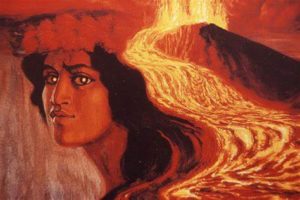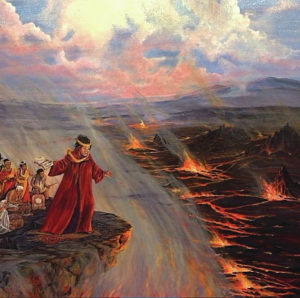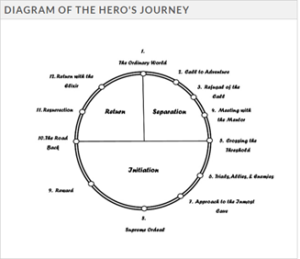Ua Mau ke Ea o ka ʻĀina i ka Pono
I have two things in common with Joseph Campbell, we both grew up as Catholic/Animists. As a reminder, “Animism is the belief that everything has a soul or spirit, an anima in Latin, including animals, plants, rocks, mountains, rivers, and stars. Animists believe each anima is a powerful spirit that can help or hurt them and are to be worshiped or feared or in some way attended to. “[1] Unlike Campbell, I am not such a great storyteller, but here it goes.
Ua Mau ke Ea o ka ʻĀina i ka Pono is a Hawaiian phrase, spoken by Kamehameha III, and adopted in 1959 as the state motto. It is most commonly translated as “the life of the land is perpetuated in righteousness.[2] Syncretism, the amalgamations of different religions, cultures, or schools of thought, is fairly common in Hawaii.
Jesus, unfortunately, was a picture of a bearded white guy in our Catholic Church hall far removed from reality, while Pele (pronounced peh leh) was pouring lava out of the volcano – Kilauea on the island of Hawaii. On a personal level, on my visit to Kilauea, I could feel the heat radiating from the lava and smell the acrid sulfur of the VOG (volcanic fog). Back on my island of Oahu, when the earth would shake and we would huddle under our school tables, just like we did for the atomic bomb drills. It was okay to believe in both religious systems (Catholicism and Animism). As a Pacific Ocean melting pot of Asian and Polynesian cultures, syncretism has always been readily apparent in Hawaii.
The redeeming part of my story is about Chiefess Kapiolani. In 1825, Kapiolani, challenged the Hawaiian Kapu system. The Kapu system was a strict legal system that governed the lives of Hawaiians. There is story told that it was Kapu (forbidden) for women to eat bananas. Kapiolani ordered one of her servants to get her a banana. When it was discovered that she ate a banana, she was not punished, but the servant was sacrificed. Yup, harsh stuff.
As adult and a converted Christian, Kapiolani sought to replace the Kapu system and to dismantle the religious beliefs in “nature gods”. She did so by climbing Kilauea and hurling rocks into the caldera. The Pele priestesses who saw her coming, warned her that she would be killed by Pele if she proceeded further. Kapiolani prayed before proceeding and many pictures have her holding the bible in her hand. Confronting Pele with the word of God. The literature of the time compared her to Elisha and the Prophets of Baal (1 Kings18). Perhaps appropriately her name ka pi’o lani means “heavenly arch” in the Hawaiian language.
Campbell does a massive job of gathering myths from around the world. Additionally, there more than 61 videos on you tube chronicling his beliefs. While I think his “elements of a good story” are spot on, I wonder about his other “unsaid messages.” It appeared to me that Campbell was a Catholic/Animist. In his interviews he aligned different belief systems in what seemed to be a New Age harmony. Alarmingly I could see how his thoughts could encourage other academics/writers/students in coming to the place where all paths lead to God. In one video he said that “Christ in us” was like the a similar practice with the Hindu worship of Shiva. He left the viewer thinking, that Christ was a valuable myth.
The Monomyth is a term coined by Joseph Campbell. Commonly referred to as “The Hero’s Journey,” it examines the stages of the hero who goes on an adventure, faces a crisis and wins, then returns victorious. [3] The diagram below reveals the elements of a good story. I gather authors, playwriters and others have used this to create a good American story. I say American, because the protagonist wins in the end. Other cultures (eastern European) have the hero/heroine dying in the end leaving the viewer/reader in a depressing funk. I remember telling a Slovak that the Hungarians told me that they were generally a depressed people. The Slovak responded, “Oh no, we are much more depressed!”
Campbell’s book is fascinating, but to shorten this post, I will chronicle my journey as the HERO.
- The ordinary world – 23 years, 6 months and 11 days in the U.S. Army. Moved every 3 years and spent 20 years living overseas.
- Called to Adventure – Full time ministry with goodsportsinternational.org in Hungary.
- Refusal of the call – I felt I needed to go to seminary first, get a big church to pray and pay for me.
- Meeting with the Mentor – Rob and Carol Greathouse, moved to Hungary to minister to people. He left City Bank and built a house in Hungary.
- Crossing the Threshold – A Baptist pastor in Bratislava said, “just go.” If you go to seminary you will never come back.
- Trials, Enemies – No indoor plumbing for 6 months (outhouse), enemies? Adapting to new country, new language, new customs.
- Approach to the innermost cave – “What was I doing in Hungary?” Was ministry to the orphanage once a week enough? Was I wasting my time?
- Supreme Ordeal – Nothing pivotal but accepting my new role, becoming a baseball coach for my village, adopting first Nikoletta Kalohelani Chun, the Levente Kekoa Chun. Building a national staff, finding an accountant, finding a lawyer. Integrating my life into little and big Hungarians. Loving them unconditionally,
- Return – After 10 years coming back to Texas to take care of ailing in-laws.
- The Road Back – Leaving our house, car and everything we had built (to include the house) with three suitcases a piece – wondering what next.
- Resurrection – Once again a student, once again a teacher, learning about refugees in the USA.
- Return with the Elixir – realizing that a missionary has to work himself/herself out of a job. That GoodSports Hungary needed to be: self-supporting, self- teaching, and self- replicating. LETTING GO, LETTING GOD.
Conclusion:
Writes Campbell…”[4]The recognition of the secondary nature of the personality of whatever deity is worshiped is characteristic of most of the traditions of the world (see, for example, p. 155, note 154). In Christianity, Mohammedanism, and Judaism, however, the personality of the divinity is taught to be final — which makes it comparatively difficult for the members of these communions to understand how one may go beyond the limitations of their own anthropomorphic divinity. The result has been, on the one hand, a general obfuscation of the symbols, and on the other, a god-ridden bigotry such as is unmatched elsewhere in the history of religion. For a discussion of the possible origin of this aberration, see Sigmund Freud’s Moses and Monotheism.[4]
He continues…”We think of ourselves as Americans, children of the twentieth century, Occidentals, civilized Christians. We are virtuous or sinful. Yet such designations do not tell what it is to be a man, they denote only the accidents of geography, birthday, and income. What is the basic character of our being? (epilogue chapter 2, The Function of Myth, Cult, and meditation)[5]
Was Campbell a Catholic/Animist? I suppose you could argue that. Having been a Catholic/Animist, the biblical story of Christ, for me is not a myth. My personal testimony (see hero’s journey) is a testimony to the active place Christ has within me…Shalom.
[1] What is animism?, GotQuestions.org, https://www.gotquestions.org/Animism.html
[2] Ua Mau ke Ea o ka ʻĀina i ka Pono, Wikipedia,
https://en.wikipedia.org/w/index.php?title=Ua_Mau_ke_Ea_o_ka_%CA%BB%C4%80ina_i_ka_Pono&oldid
=1130356469
[3] Joseph Campbell, and David Kudler. The Hero with a Thousand Faces. Joseph Campbell Foundation,
2020.
[4] Joseph Campbell, and David Kudler. The Hero with a Thousand Faces. Joseph Campbell Foundation, 2020.
[5] Joseph Campbell, and David Kudler. The Hero with a Thousand Faces. Joseph Campbell Foundation, 2020.
epilogue chapter 2, The Function of Myth, Cult, and meditation)
6 responses to “Ua Mau ke Ea o ka ʻĀina i ka Pono”
Leave a Reply
You must be logged in to post a comment.



Fascinating post, Russell. Your post is the first I’ve read that walked one’s own story through Campbell’s monomyth — well done. I’m curious, though, which one of these stages along the hero’s journey might have been the most difficult for you to find a dynamic equivalent in your own personal journey. Secondly, with your reference to animism, and now having read Campbell’s book, I wonder if you’ve ever come across Don Richardson’s Eternity in their Hearts (I believe he also wrote Peace Child). I had to read that book many years ago for a class. Richardson wanted his readers to see ways that God had given a “prior witness of his existence” (Richardson, 30) to pre-Christian people throughout history. Just curious if that every crossed your library.
Thanks for your comments. As I came to Christ at 33, the verse Ecclesiastes 3:11, was presented to me. It really rang true. My close friends in Hawaii (class of 77!) were mostly from Asian backgrounds and so Buddhist, Taoist etc… The eternity in our hearts was filled by Christ. Sort of amazing, we all went our separate ways and 10 years later had all encountered Christ. Awesome.
Pre-Christ, my mental argument was the question, “What about the Babylonian Shoe salesman?” For many years I wondered about the people born BEFORE Christ.
Of course, that wasn’t the real issue. If I accepted Christ, what about all my family who were entrenched in the pagan animist ways of Hawaii. I could not accept a religion that would leave them all behind.
As time progress I discovered that my friends had accepted Christ AND my family had accepted Christ (beyond the Catholic/Animist type). I began to see that each of us has a journey towards Christ. Some see it sooner than others. Others never do. The issue was not mine however to get bent out of shape over. My job was to present the gospel with the Holy Spirit convicting of sin. This led me to Hungary for 21 years.
If you ever feel called to minister in Hawaii, the harvest is plentiful but the workers are few….Shalom…Russ
Russ, thank you for pointing out that Campbell’s monomyth dovetails particularly well with an American worldview, not so much with some other cultures. And yes, I understand that he pulled in myths from many other cultures; my point is just that his monomyth is perhaps not as universal as he claims. The first example that comes to mind (and it’s been a while since I’ve seen it so my recollection may be foggy) is Crouching Tiger Hidden Dragon (unless maybe Campbell would say that the Elixer the main character brings is honor to her community by committing suicide). French films are also notoriously divergent from the hero’s journey. They typically have very little action and end leaving loads of questions unanswered. We kind of have a running joke in our family when an American movie reaches the “Abyss” moment and fades to black we say, “And…if the movie were French, it would end right there.” Of course, Hollywood doesn’t work that way and the hero always returns home.
Thanks Kim for your comments. I have lived overseas for 30 years and have learned to see that Americans have a “Positive” world view. Sometimes this world view helps to minister to others, sometimes it is SO out of place and cultural context.
My wife was a missionary in Budapest, Hungary when I met her. After we got married (retiring from the Army) and moving to Hungary, she wrote this book.
Love&Ashes: A Bible Study of Love, Loss, and Ultimate Romance
, https://www.amazon.com/Love-Ashes-Bible-Ultimate-Romance-ebook/dp/B004E10XS0/ref=sr_1_3?qid=1675363367&refinements=p_27%3ATrudy+Chun&s=digital-text&sr=1-3
Trudy, who was Beverly LaHaye’s ghost writer when I met her, was tired of the Disney, happy ever after stories. She used several examples of people in her life who just did not win the elixir and were recovering from the pain and difficulty of failed relationships. The HAPPY romance was of course, one based in Christ (the book is a bible study).
Having grown up Oriental (I guess Asian is the present politically correct term- but who cares) I grew up where the heroes family was killed when you were a child, you grew up strong, learned a cool martial art, then returned to kill every man, woman and child. Happy ending for all!
I do love mythology and lore. My daughter (at the AF Academy) is so into Mythology that we listen to the Overly Sarcastic Productions which has a lengthy list of myth summaries.
https://overly-sarcastic-productions.fandom.com/wiki/Miscellaneous_Myths#:~:text=Miscellaneous%20Myths%20is%20another%20series,upwards%20of%20fifteen%20minutes%20long.
In the spirit of doing what my daughter likes, we listen to it every Sunday when I pick her up from the AF academy. We actually discuss the “eternity in men’s hearts” Ecc 3:11. And sort of wonder at how myths answered/did not answer the “God Shaped Void” in all of us (Pascal)….Shalom…Russ
Russell,
Thank you for sharing your journey, your thoughts, and the lovely pictures of Kapiolani. Her story seems to follow Campbell’s outline. I thought it was interesting your experience with the eastern European perspective and it sounds like they take pride in their depression. You mentioned a possible post-communist response. Do you recall myths or stories from their cultures that would explain that perspective?
Depression and suicide are a national characteristics in Hungary. Not only is it OKAY to be depressed, but I wondered if my personal UN DEPRESSION hindered me from initially connecting with our ministry audience. Adults were trapped in “the good guys get trampled…bad guys always win” mentality. I found my way with the younger generation (10 year old boys are not so depressed). Then as they grew to teens, then adults, they learned to compare their countries tendency’s with the HOPE we have in Christ. Most of my team accepted Christ along the way.
Right now Hungary is on the side of Putin. They told my visiting team that CNN was making Hungary look bad (world wide). Once again their “us against the larger world” was kicking in. Two people told me that it was wrong for President Biden to tell Hungary what to do. I told them “wait a minute let me call Joe….Oh well, he is not taking my calls.” I reminded them that I was there to work with Ukrainian refugee children. Sigh.